One of the most important contributions of Carl Jung to analytical psychology was the concept of individuation – the process of differentiating the true, unique self out of the persona, or social mask, that each of us have created to make a desired impression on others and to conceal our true nature. Although some elements of this mask are consciously chosen, most of them are derived unconsciously out of long-forgotten childhood experiences. Without a life-long commitment to individuation, our mask locks us into inauthenticity and a limited ability to be fully present to life.
Bogdan Tabacaru, an experienced and talented director, used some of Sanford Meisner’s teachings using script text and improvised scenes to help each of us begin to set aside our mask just a little bit so that we could authentically step into the shoes of vulnerable characters on stage.
Everything having to do with acting (and life itself, for that matter) begins with our bodies, so Bogdan had us begin by moving around the room and improvising our own stretching, bending and moving routines. “Don’t pay any attention to the others, just do your own thing,” Bogdan would call out to us. But I was watching the graceful bending and dancing steps of the others as I struggled with my stiff, old body. It was an element of my mask, not wanting the others to see that.
Then Bogdan told us to close our eyes even as we continued walking slowly around the room. I was a bit anxious at first but slowly relaxed as trust in myself and the others in the group began to grow. Bogdan kept circling around the group, speaking softly, offering coaching and ensuring no one was actually moving in an unsafe direction.
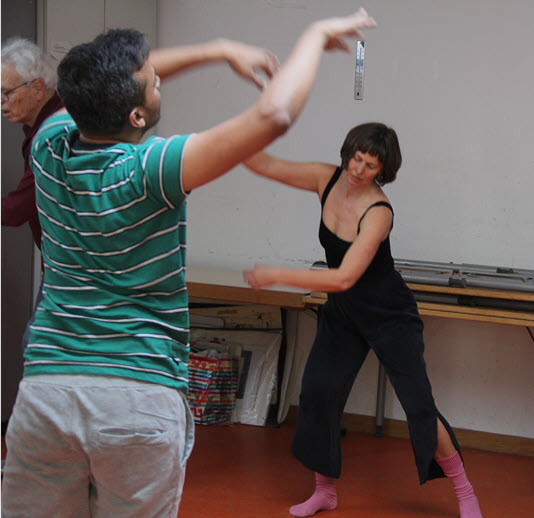
I noticed how much information about my environment was still available. Even with my eyes closed, there was a distinct brightness that was apparent if I faced toward the windows. Sound echoed differently if I was near a wall rather than in the center of the room. The sound of nearby breathing told me if I was near someone else. When I came in contact with someone, there was just a simple touch of greeting and acknowledgment and then a turning away and continuing on.
Then, after a while, we were asked to hold the hands of the next person we came in contact with and soundlessly greet and acknowledge them. I noticed a curious anxiety when it took me a bit of time to find a partner who was still free – was that another element of my mask? Then there was the encounter, the small adjustment so we were directly facing each other, and then the sudden warmth and smoothness of my partner’s hands. It was astonishing how much satisfaction and connection we could establish just in this limited way. When Bogdan guided us to acknowledge our gratitude through our touch and then move on, I felt a bit of sadness over the farewell even as I sensed the strengthened trust and connection with everyone in the room.
At the end of the third encounter, Bogdan told us to open our eyes and greet our partner for many of the exercises that we would be doing for the rest of the day. My partner turned out to be Raquel, a delightful lady I had first met late last year. We had chatted a bit from time to time and enjoyed a play reading activity together, but this was somehow different – there was a sense of trust and connection that had been created through the exercise that was almost as if I were meeting Raquel again for the first time.
Bogdan then gave each pair a couple pages of script dialogue, asked us to read through it together, and to decide what the characters wanted and what their obstacles were. Then one pair would sit facing each other and begin.
“Don’t worry about the text,” Bogdan would call out, “just be with each other.” I could only wonder what he was talking about. There hadn’t been time to learn the text; was I just supposed to make something up? (Another little piece of my mask, the ‘I have to do it right” part, showing up?)
Then Bogdan would interrupt us with questions like, “What are you getting from your partner?” ; “What do you need from your partner?” ; and “How can you give your partner what he/she needs in order to get what you want?” Then, when we had each answered as best as we could, he would ask us to start again from the beginning.
For me, the character whose lines I was reading sort of drifted into the background and I found that I was answering as Roger and experiencing a somewhat uncomfortable revelation that what I was trying to show and hide in my reading might also be what I was doing in real life.
Still, in this safe space where we had already created so much trust, being vulnerable and open was like a warm, welcoming light revealing to me the possibility of more acceptance of who I am.
When I was in the audience and watching other pairs go through the same exercise (most of whom I have known for some time), I felt a wonderful sense of our shared humanity.
It was a special bonus that Raquel and I could chat about our shared experience during a break later in the day and retain that openness and vulnerability together.
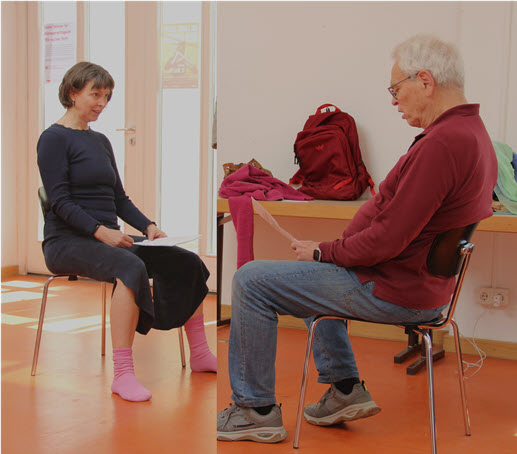

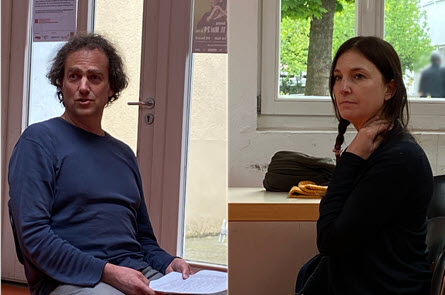
There were several other exercises as well that helped me get more clear about the importance of not trying to “be the character” on stage but rather being who I am in the imaginary circumstances portrayed in the script. (Yes, the essence of Meisner’s teachings!)
In case all of this sounds too serious, many of the exercises were more than a little silly. One of my favorites was the “hitchhiker”. Four of us would sit as though in a car and the driver would “notice” a hitchhiker and “pull over” to invite them to get in. The “driver” would return to the audience, the others would rotate their seats, and off they would go again.
What made this fun was that each hitchhiker would make up who they were, how they moved and how they communicated as they got into the car – not by words but by being who they were. Once in the car, everyone else would become a similar being and interact with each other in that mode (and the driver would drive in that mode) for a bit until the next hitchhiker appeared.
The first hitchhiker decided they were a cat and on it went from there. We had hitchhikers deciding to be fish, monks, cripples – even a blind man tapping a cane in front of him! My goodness, how would a blind man drive a car?
Everyone could be a new hitchhiker as many times as they wanted and we all laughed ourselves silly as our choices became more and more outrageous.
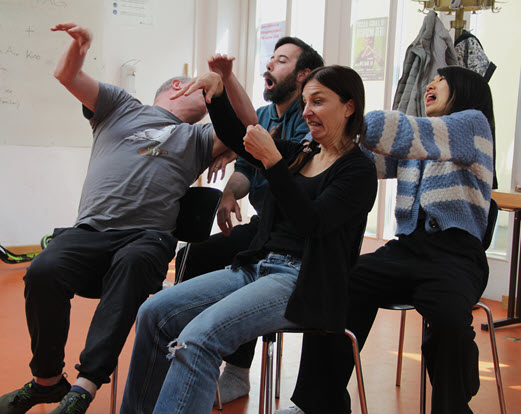
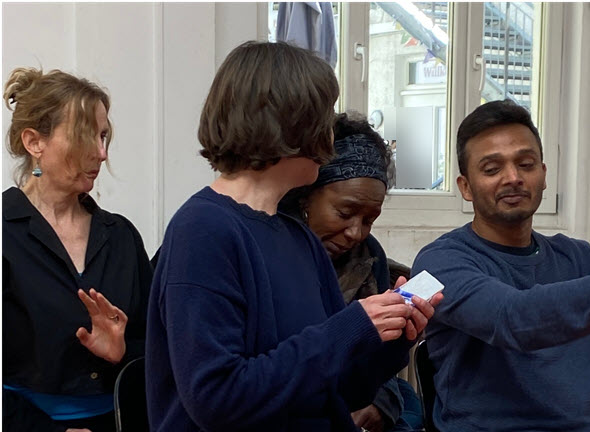
For me, it was an important demonstration that not worrying about “doing it right” but rather focusing on having fun and enjoying the connection with others is the fertile ground out of which authentic performances can grow.
Perhaps even more important, I left the workshop with a sense of having gained a bit of insight into living more truthfully in my real life.


We all look at the goal, in life, in work or in play, but the journey and most important the process is where the real value is. This was a dive in the acting and living process that directed us through the darkness and back out. The day flew and was another great workshop run by WUT., Thanks to all involved and that organized.
I really enjoyed observing one of Bogdans exercises!
The message „to be real and authentic „ by using psychological approaches and the idea of unmasking is thrilling for me and catches in my opinion the necessary depth which is needed to understand what actually performing art is about.
Bogdan held this workshop beautifully ~ with a full awareness of an actor’s need to access vulnerability while maintaining an intuitive sense of respect. I deeply appreciated how he consistently brought us back into an awareness of what we were experiencing in our bodies, the source of all true connection. Thank you, Bogdan.